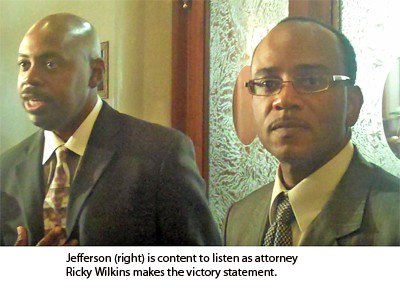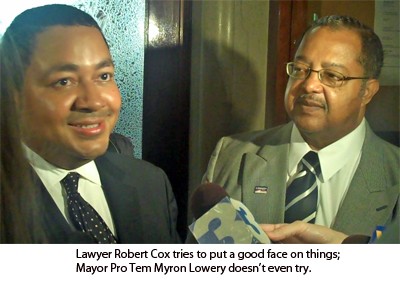Chancellor Walter Evans made what was a Solomonic decision in the strict sense Wednesday afternoon. Declining to split the middle on the issue of city attorney Elbert Jefferson’s suit against acting mayor Myron Lowery, Evans upgraded Jefferson’s restraining order into a fully-fledged injunction which prevents Lowery from arbitrarily firing him or apparently even suspending him for anything short of demonstrated “mis-feasance,mal-feasance, or non-feasance.”.
The decision came after a four-hour hearing in which Jefferson, Lowery, and city council attorney Allen Wade all testified about various aspects of the case.
 JB
JB
His judgment was based, Evans said, on city charter provisions which clearly require a majority vote by the council to approve the kind of termination which Lowery tried to impose on Jefferson within minutes of becoming mayor pro tem last Friday. As the bashful-seeming city attorney explained from the stand Wednesday, he had barely finished applauding the conclusion of Lowery’s ceremony when the new mayor approached him and offered him a choice between alternate employment and an immediate firing.
Lowery, who would confiscate Jefferson’s building pass on the spot and have him ushered from City Hall by a policeman, announced his action at an impromptu press conference with members of the media. That Lowery’s abrupt action, apparently meant to demonstrate his take-charge attitude toward his new job, had backfired became evident in the next few days when a negative reaction developed among the council members who would have to approve such a move.
Essentially the council’s six other black members formed a bloc to oppose Lowery, who, an African American himself, had pointedly joined the council’s six whites in several recent 7-6 votes that resulted in the declaration of a mayoral vacancy and the calling of a special election. The six blacks were all, to one degree or another, supportive of outgoing mayor Willie Herenton’s withholding a formal letter of resignation in an apparent effort to maintain control over the time and mode of his departure.
Among the issues debated by Jefferson, Lowery, and their legal teams was that of whether the tenure of a department head like Jefferson should be regarded as co-terminous with the period of service of the appointing mayor or with the full term to which that mayor was entitled. Evans seemed to opt for the latter sense, or at least not for the narrow interpretation desired by Lowery.
Not only was the verdict a total victory for Jefferson, Lowery was even prohibited from impeding with the city attorney’s conduct of his job. Left in limbo was the question of how much authority could be exercised by Veronica Coleman Davis, the former U.S. attorney whom Lowery had intended to appoint city attorney in Jefferson’s stead. Coleman Davis had been named instead as deputy city attorney.
 JB
JB
Somewhat valiantly, Robert Cox, the lawyer who functioned as Lowery’s hearing attorney Wednesday, attempted in an impromptu press conference afterward to represent the outcome as a victory for the mayor pro tem,contending that Lowery, too, had always maintained that council approval was necessary to terminate Jefferson. On the stand, Lowery had characterized the matter as a chicken-and-egg question in which his action in firing the city attorney should logically have come first. “I acted properly,” he said.
A truer indication of the Lowery team’s reaction had come when Cox and co-attorney Dale Tuttle first emerged from post-hearing consultations, along with Jefferson’s legal team, in Chancellor Evans’ chambers. Cox and Tuttle had each touched their client’s elbow softly in what could only be seen as a consoling gesture. Then Evans made his ruling.
Most political observers had seen Lowery — who, along with the rest of the field in the mayoral race, has been polling far below the presumed leader, Shelby County Mayor A C Wharton — as being in a Catch-22. His initial series of bold actions, including his attempted firing of Jefferson, were seen as the means by which Lowery could demonstrate his determination and prowess as an activist chief executive and thereby gain on Wharton.
Instead, the mayor pro tem — who declined to say whether he would pursue Jefferson’s termination but likely won’t — seems to have been handed a setback that will force him into a caretaker’s role and limit his potential in the special election, scheduled now for October 15.